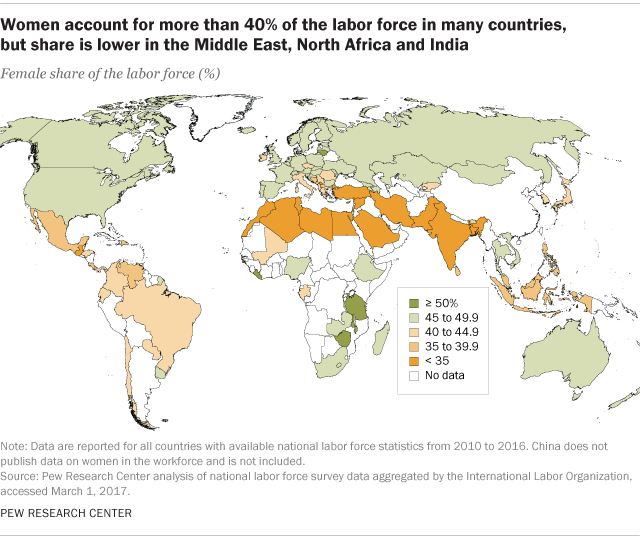Do Men Support Women To Join Workforce? New Study Finds More Women Part Of Work Force In Sub-Saharan Africa Than America

The findings of two new and separate worldwide survey and poll on the occasion of this year’s Women’s day casts new light on this year’s theme of gender equality in work.
While one poll by the Pew Research center suggests that women make almost half the workforce in more than 80 countries, another poll by Gallup in collaboration with International Labor Organization (ILO) found that millions of more women would like to join the workforce and surprisingly millions of men also support the same.
Interestingly, although with women account for 46.8 percent of the labor force, the Pew Research report found the United States to be above the median female share of the workforce (45.4 percent), about 39 countries including several sub-Saharan African countries such as Zimbabwe, Malawi, the Gambia, Liberia and Tanzania outranked the United States. Women in the labor force comprise workers either with jobs or looking for work. However, the survey points out that many of quality of jobs for many of these women may is under question as they fall under the irregular, informal economy and have less stable incomes.

The Gallup poll which asked 149,000 adults in 142 countries found that 70 percent of women and a 66 percent of men want women to enter the workforce with paid jobs. This figure, a big majority of which comprises women who are currently not in the workforce is more than double of those who would prefer women to stay at home.
“Even in Northern Africa, where women’s and men’s attitudes are farthest apart, 79 per cent of women and 57 per cent of men believe work outside the home is acceptable,” reads the key finding of the report.
The report also found that both men and women agree that maintain “balance between work and family” is one of the biggest challenges.
“Balancing work and family is the No. 1 challenge in developed and emerging economies, while unfair treatment at work is the most frequently mentioned concern in developing economies. Lack of affordable care for children and relatives is a bigger challenge in emerging and developing economies than it is in developed ones. And unequal pay tops the list only in developed economies,” reads the key findings of the report.
The report also notes that around one in four women, say that they provide the majority of the income for their households but the report finds men in disagreement as they say that they provide the main source income. However, the report finds that in every region across the world, the gender gap shrinks with education.
“The gap among employed women and men who say they make a small contribution to their household’s income is also smaller among those with higher levels of education,” says the report.
© Copyright IBTimes 2024. All rights reserved.





















